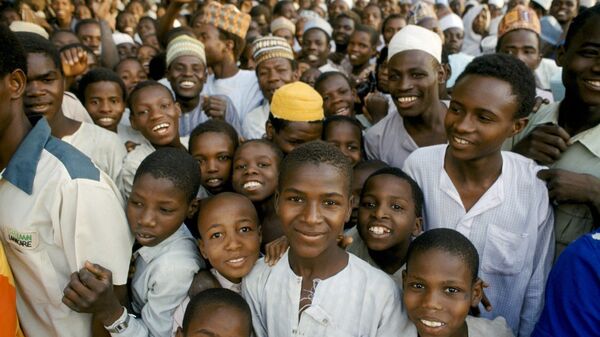MOSCOW, August 13 (RIA Novosti) - A projected increase in Africa’s child population indicates the continent will become home to two in five of the world’s children by 2050, a United Nations children's fund UNICEF report revealed.
“Our previous reporting of one in every three children in the world living in Africa by 2050 has proven to be an underestimate: the population revisions now indicate that by mid-century the continent will be home to around 41 per cent of all of the world’s births, 40 per cent of all global under-fives, and 37 per cent of all,” the Generation 2013: Africa report says.
High fertility rates combined with an increase in women of reproductive age suggests nearly two billion babies could be born in Africa over the next 35 years according to UNICEF’s Generation 2030: Africa report published in August 2014.
“The seismic demographic shifts that Africa's child population will experience are among the most important questions facing the continent, and indeed vital issues for the world. It is time to acknowledge our shared responsibility to the future of Africa and take the policy decisions required for all Africa's children to finally realize all of their rights,” the UNICEF report adds.
Despite improved child mortality rates in Africa, the continent still accounts for nearly 50 percent of child deaths in the world, and could potentially increase to 70 percent by 2050. Three in 10 African children live in conflict-affected environments, according to the report.
The Generation 2013: Africa report calls for increased access to reproductive health services and efforts to keep girls in school. Africa’s national development requires strengthening civil registration and vital statistics systems in response to future demographic shifts.
“This report must be a catalyst for global, regional and national dialogue on Africa’s children,” said Leila Gharagozloo-Pakkala, UNICEF’s Regional Director for Eastern and Southern Africa.
“By investing in children now – in their health, education and protection – Africa could realize the economic benefits experienced previously in other regions and countries that have undergone similar demographic shifts,” the director added.
According to UNICEF Regional Director for West and Central Africa Manuel Fontaine, equity-based programs and policies for children are a deciding factor in whether Africa can break the vicious cycle of poverty and inequality.
Africa is currently the world’s second-most populous continent, with over one billion of the world’s over seven billion inhabitants. Africa is the only region where the population is expected to increase throughout the 21st century.



